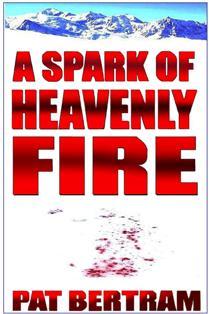Pat Bertram's Blog, page 68
February 28, 2021
Celebrating My 3,000th Blog Post
As the title of this blog post indicates, this is my 3,000th blog post. It seems amazing to me that I’ve managed to find so much to write about. It seems even more amazing that after writing all those words, as well having written nine books (all published!), that I don’t feel wiser. But then, becoming wiser was never the goal. The goal was simply to write, and that I have done.
When I was a kid, I often used to get diaries for Christmas. I loved those books with the little key that could lock one’s thoughts away. I always started out disciplined, writing a bit every day, but gradually, perhaps after the first week or so, the entries became fewer and fewer. And always, most of the pages remained blank.
It’s not surprising, really. When one is so young, there’s not really much to say. “I went to school.” “I went to church.” “I did my homework.”
I hadn’t yet learned to try to work out my feelings on paper. In fact, I hadn’t yet learned my feelings were valid. Life just is, when one is so young. You don’t know that life can be different. You don’t know that you can be different. Each day seems so much the same, with the same drudgeries being replayed and replayed again. School. Homework. Chores.
I suppose I could have written about the books I was reading, but I had not yet learned to be critical. I read in the same way I breathed: inhaling without thinking about it.
When I grew up and left town for a while, I used to write letters to good friends, telling about my trials and tribulations, but after a friend found some of my old letters and read them back to me, as if expecting me to share her hilarity at my naivete, I stopped writing my thoughts and feelings to anyone, not even myself. I still talked about such things, but I never again wanted a record for anyone to laugh at. (She thought I would like to know how much I had grown after the letters had been written, but I didn’t see that at all; I only saw that the younger me with all that angst had become a figure of fun.)
And yet here I am, telling the world my every thought, my every pain, even my triumphs.
Although this blog — this weblog — was not supposed to be anything more than a platform for my author-ity (authorness?), it became so much more after Jeff died — a scream of pain, a way of finding sanity in the chaos of grief, a place to tell the truth about what I was feeling. Later, as the pain abated, it became a way of tracking my growing will to live, to become someone who could survive — and thrive — alone.
Even later, it became something of a travelogue, as I wrote about my various road trips, and later still, it became the chronical of first-time homeowner.
What I have ended up with, after all these years, is that diary I never had the discipline to keep when I was younger. I seldom go back and read older articles, but they are here if I ever need to remember all I have done in the years after Jeff’s death.
Mostly, though, I just write for the day. It has become a way of standing tall, and saying to the world — and myself — “This is who I am right now.”
And who I am right now is someone who is celebrating her 3,000th blog post.

***

Pat Bertram is the author of Grief: The Inside Story – A Guide to Surviving the Loss of a Loved One. “Grief: The Inside Story is perfect and that is not hyperbole! It is exactly what folk who are grieving need to read.” –Leesa Healy, RN, GDAS GDAT, Emotional/Mental Health Therapist & Educator
February 27, 2021
A Better Mood
I was very discouraged yesterday, not just because of the fiasco on facebook (not a typo, it doesn’t deserve the respect of being capitalized) and being banned for unfairly and untruthfully being labeled abusive, but because of several other issues too, the main one being my car.
I had a tune-up toward the end of last year, including replacing the spark plugs, and the venerable 49-year-old VW bug sailed along as if it were a youngster again. Within a month or two, I started having problems with the car bucking. At first I thought perhaps the choke wasn’t working due to the frigid winter weather, because everything seemed to work better once I’d been driving a few miles, but when the weather cleared, the bucking got worse the more I drove.
So I took it back to the mechanic, and he discovered that those new spark plugs had already burned out. At the same time, he found that a part in the carburetor wasn’t working properly, and it was letting too much air into the engine. I’m going to have him replace the carburetor, but those spark plugs burning out so fast sure worried me! After a bit of checking on the internet, I discovered it was due to the engine running hot, which was due to a lean fuel mixture (too much air in the fuel), which was due to the carburetor not working right. Who knew? Well, any mechanic or mechanically inclined person would know, just not me. Now that I know that the spark plugs won’t always be burning out every month or so and that the car can be fixed, it makes me feel a lot better.
At least about that.
I still feel discomfited about the whole FB thing: that people would on purpose sabotage me and that there is no recourse, but I’m gradually finding my way back to a better mood, especially since there’s nothing I can do about the ban. In the long run, I suppose, it doesn’t really matter. With as much as FB is changing, and with as many “friends” who are voluntarily leaving, I have a hunch the site wouldn’t do book sales much good anyway. (I tell myself that because if I really thought it was hurting me as an author, I’d be furious, and I don’t want to be angry.)
I’d considered signing up for Instagram now that I have a phone that is powerful enough and big enough to edit photos and to handle the site, but Instagram is owned by FB, and I don’t see any point in rewarding anyone who treats me badly.
The one good thing that happened yesterday, besides finding out that my car can be fixed, is that while I was outside town test driving my car after I picked it up last evening, I was able to see the sun setting and also the moon rising. By the time I could stop to take a photo, though, the moon had shrunk somewhat. Still beautiful, though!

***

Pat Bertram is the author of Grief: The Inside Story – A Guide to Surviving the Loss of a Loved One. “Grief: The Inside Story is perfect and that is not hyperbole! It is exactly what folk who are grieving need to read.” –Leesa Healy, RN, GDAS GDAT, Emotional/Mental Health Therapist & Educator
February 26, 2021
Abusive?

When Facebook first banned this blog from their site, the reason given was that this blog is spam. Yesterday when I tried sharing the post from the FB share button (which is now removed) at the bottom of the post I’d just written, I got a different explanation. They said: Your message couldn’t be sent because it includes content that other people on Facebook have reported as abusive.
Abusive? Me? Really? I have posted a handful articles (out of a total of 2,997) that might be considered controversial, though I do try to steer a middle ground. Even so, those articles were in no way abusive, weren’t even very controversial since I wasn’t taking a stand so much as trying to sort out what I felt about the political turmoil. Sometimes when I think I’m being the most helpful or logical or innocuous or agreeable, it surprises me that not everyone agrees with what I say. To be honest, I don’t always agree with what I say. As with those few controversial posts, so often by writing for this blog, I am trying to work through a problem, an idea, a spot of confusion, and sometimes, after I’ve posted the article, I realize that because of the writing, I came to a different conclusion.
But abusive? I cannot think of a single time I said anything that anyone could say was abusive. I always try to be nice, even when people aren’t nice to me. It’s what I do. It’s who I am.
Although I did not appreciate this blog being blocked because of spam, I thought maybe their bots had picked up on the repetitious bio at the end of the article, or perhaps all the links I used in the bio. Even though it did no good, I removed the links and am alternating bios to make sure other sites don’t have the same issue, but as it turns out, that wasn’t the case at all.
Abusive?
That upsets me because it is so unjust and pejorative. What’s even worse is the current system, where anyone can say anything about any person for any reason, and no matter what harm is done, there is no recourse, at least not with Facebook. I have messaged them via FB. I have emailed them. I have sent letters to their headquarters. But apparently a few grouches (that’s the only thing I can think of — that people were grouchy and ticked off that somehow a post of mine got added to their feed) can determine someone’s fate.
FB was my primary means of promotion. I spent a lot of money with them over the years. It’s probably people who saw those posts who labeled them abusive, rather than any of my FB “friends,” but that’s not my fault. I’m not the one that posted the links on those feeds; FB did.
Ironically — and cruelly — whenever I do happen to stop by FB to see if someone left a comment on my page (which I will be doing less in the future, so if you want me to see a comment, please comment here on the blog rather than on FB), I find copious messages from FB telling me I’m not posting enough and I find even more messages telling me how important it is for me to pay them to promote my posts.
If it was me personally they had a problem with, I could simply set up a new account like so many others have had to do, but they have no problem with me personally. Just my oh, so non-abusive and very personal blog.
I have found a way around their ban for now — I reblog my posts to another blog, and then post the link to the second blog on FB. I wouldn’t even be doing that much, but several people said they missed too many of my posts. They could, of course, just sign up for my blog, but these are people who spend time on FB, and so that’s where they like getting their notifications.
I know FB is a huge site, but Google is even bigger, and when I had a problem with Google for banning my blog, they responded to my query, and WordPress helped me fix it. (It was a bit of stray code — innocuous code — that somehow got attached to one photo in one post.) But FB? Nope. Once you’ve been branded as abusive, that’s it for you . . . forever.
No one has to prove their accusation. No one checks the truth of it. To me, acting on unfounded allegations is abusive. My posts are not. If you disagree and can point out any abuse, please let me know so I can change it. Just be gentle. My feelings are hurt enough right now.
***

Pat Bertram is the author of Grief: The Inside Story – A Guide to Surviving the Loss of a Loved One. “Grief: The Inside Story is perfect and that is not hyperbole! It is exactly what folk who are grieving need to read.” –Leesa Healy, RN, GDAS GDAT, Emotional/Mental Health Therapist & Educator
February 25, 2021
Tarot Update

I’m glad this is a short month, but not for any reason you’d expect. It’s not that I’m especially looking forward to spring; I certainly won’t mind warmer temperatures (though I do dread the wind). And I’m definitely not looking forward to March and the anniversary of Jeff’s death, though I must admit that after all these years, the day doesn’t carry the pain it once did.
The real problem this month is with the tarot deck I’ve been using. Each month for the past nine months, I’ve chosen a different tarot deck from the collection my deceased brother left me, trying to see if any of them resonate with me. I don’t do readings, just ask a question like “what do I need to know today” and then pick a card to study. So far, there hasn’t been any special connection to any deck, though I have liked some more than others.
The one I am using this February is the one I like least of the decks I’ve sampled. There are others I dislike so much I won’t use them, such as the witch’s tarot and a renaissance tarot that feature anatomically correct figures, something I don’t particularly need at the start my day. But this one — The Jungian Tarot — seemed interesting in that the cards were supposed to be tied to Jung’s archetypes, but only some of them were archetypal (the Major Arcana and the court cards). Most of the cards I dealt myself were the numbered cards, and they did nothing for me, especially since I kept getting the same card — the ten of wands.
The ten of wands certainly seems to illustrate its meaning — oppression — because it is a particularly oppressive card.
I could, of course, changed decks in the middle of the month, but then I wouldn’t get as good a feel for the cards.
In another three days, I’ll be picking a different deck. I hope that one will be more to my liking.
***

Pat Bertram is the author of Grief: The Inside Story – A Guide to Surviving the Loss of a Loved One. “Grief: The Inside Story is perfect and that is not hyperbole! It is exactly what folk who are grieving need to read.” –Leesa Healy, RN, GDAS GDAT, Emotional/Mental Health Therapist & Educator
February 24, 2021
Snow of a Different Sort
The most recent snow finally melted under the oh, so welcome sun. Unusual for Colorado, the skies glowered at us for several days, maybe even a couple of weeks, without even a hint of sunshine, but the weather is back to more normal temperatures and bright sunshine. Tonight, another storm is expected, but it shouldn’t be long lasting because the temperature for the next days (as in the previous couple) will be well above freezing.
Meantime, I found snow of a different sort:

Yes! A snowdrop!
This must have been one of the bulbs that survived the drought of last winter and the searing heat of the summer, because I didn’t plant any snowdrops last fall. I’ll be curious to see if any other of the previous year’s bulbs will make an appearance, but I am just as thrilled with a single blossom as I would be with a whole slew of them. Well, almost as thrilled. Someday I hope to have a yard full of flowers and flowering bushes, but until I learn enough, and until I plant enough, I’ll be grateful for every flower that decides to bloom.
By next week this time, the weather is expected to be spring like. I’ve been hunkering down because of the cold, I wonder what it will be like to un-hunker. Probably not much different, actually. The last couple of weeks I’ve been back doing errands on foot, and that will continue, as will all the hours spent reading and blogging and playing games on the computer.
There won’t even be any gardening to speak of — around here, the last frost isn’t until the first week in May, so there’s no point in planting anything until then.
But I can dream of flowers to come.
And I can enjoy the flower that came.
***

Pat Bertram is the author of Grief: The Inside Story – A Guide to Surviving the Loss of a Loved One. “Grief: The Inside Story is perfect and that is not hyperbole! It is exactly what folk who are grieving need to read.” –Leesa Healy, RN, GDAS GDAT, Emotional/Mental Health Therapist & Educator
February 23, 2021
Warm War
A blog reader mentioned that he is wondering to what extent life will be altered by our experiences over the last year or so, and now I’m wondering, too. I have thought about the future now and again, not the particulars so much as the fact of it: no matter what happens with The Bob, our lives will be changed, it’s just that I don’t know — can’t know — how far reaching these changes will be.
It seems to me that the world will settle down eventually into new patterns, but again, there’s no way of knowing right now what those patterns — economic, social, political — will be. There’s also no knowing if those in power will ever let us know.
All of this rearranging of the world, our mores, what we’re willing to give up to for a facsimile of safety reminds me of a world war, because that is what happens during a world war. Everything is different, chaotic, but eventually life settles back into a new pattern, and younger generations never realize things were ever different. For example, think of all the millions of people who are alive today who have never experienced a world without airport security and checkpoints. They’ve never gone to the waiting room with their departing loved ones, never stood at the window waving good-bye as the airplane took off.
I’m sure, in that same way, upcoming generations will accept as right and proper whatever the world becomes after The Bob, because they won’t know anything else.
This obviously isn’t a hot war, with military conflicts killing off the young and strong. Nor is it a cold war being fought mostly with propaganda and fear, where countries are in a perhaps fatal stalemate, waiting for one or another to tip the balance of power. So what is this that we’re going through? A warm war? People are dying in vast numbers, though for the most part, the casualties of this war aren’t the young and strong but the old and weak. (A friend believes this is all about depopulation, though again, there’s no way to know for sure. There are always a dozen or a dozen dozen reasons for any worldwide conflict, with everyone involved trying to gather more power for their own particular interest groups.)
As I said, there’s no way for me to even begin to guess what the end result will be. We’re simply not being given enough information about important matters such as who, actually, was tweaking this virus, who let it loose and why. Was it on purpose? An accident? All these are the same questions my characters in A Spark of Heavenly Fire asked when a deadly organism was unleashed on the world, but that was a novel, and novels need some sort of resolution. Not so “real life.”
It’s easier to speculate about alterations on a more personal level, since although I don’t know all the particulars of The Bob and the reasons behind it, I do know how it is affecting my life. So far, I’ve managed to stay healthy, but a lot of that is due to spending most of my time alone. It’s hard to catch something from yourself, though I have done that — allergy attacks that become so devastating they might as well be a infectious disease. Mostly, though, I have managed to maintain my health during this time — no colds or flu or anything catching — which tells me that staying away from people is good for my health.
I’ve always been a bit of stickler when it comes to opening doors, such as those to a public restroom, making sure I use a paper towel to turn the door handle, and that won’t change, though I won’t feel as abashed about it. Nor will I ever use a public restroom again except in a dire emergency.
I’ve always been a bit antsy about standing in lines, and I will no longer do so unless people keep their distance. I have never liked people breathing down my neck, and even more so now.
I have a hunch, as things get back to a state that at least feels normal compared to the siege mentality we are now experiencing, I won’t be as loose and free as I was during the previous few years. I won’t be as willing to attend events where more than a few people are present, won’t be as willing to embrace strangers as I did, won’t be as determined to be sociable. It was always hard for me to be outgoing, but I did make the attempt because not to do so would be limiting my life in an unhealthy way, but I’m not sure if I’ll ever get back to the point where I feel the necessity.
But then, what do I really know? This warm war will change us, all of us, even me. And the “me” to come might be more willing to be bold, to get out in public and let life — and death — fall where they may.

***

If you haven’t yet read A Spark of Heavenly Fire, my novel of a quarantine that predated this pandemic by more than ten years, you can read the first chapter online here: http://patbertram.com/A_Spark_of_Heavenly_Fire.html
Buy it on Amazon here: https://www.amazon.com/gp/product/B0024FB5H6/
Download the first 30% free on Smashwords: https://www.smashwords.com/books/view/1842
February 22, 2021
Too Much Time Alone?
The book I am currently reading is about a computer genius, which makes me wonder: what did computer geniuses do before computers? Were those the folks back in prehistoric times who notched rocks to tally up goods or time or simply as the development of mathematical thought? Or were these the folks the village idiots, unable to do anything practical because the tools of their trade had not yet been developed? Or perhaps these are the folks in insane asylums, banging their heads against the walls because they have no other way of processing the codes they can see inside their minds?
Or did our brains evolve along with the computer? Since obviously there was no need for computer geniuses until the computer was invented, did the universe or natural selection or whatever it is that decides these things, keep our brain development in line with our tool development?
Can you tell I am spending too much time alone? With no other stimulation than the books I read, the computer game I play, or interacting with people via this blog, I am pretty much left to my own devices, which means wondering about foolish things.
It could be worse, though. I talked to an acquaintance today who was off work for two months battling The Bob.
I’m always hesitant to wish for things because whoever it is or whatever it is that grants our wished is utterly diabolical. A couple of months ago, this person wished he had more time at home with his wife, and do I need to tell you what happened? Yep, both got sick, so they got to spend a lot of time together.
They’re both mostly doing okay now, which is nice because others I know didn’t survive.
Since I no longer follow any news source, my only news comes in the form of sporadic gossip, so I don’t know the truth of this or not, but supposedly, they are expecting The Bob to be around and causing havoc for the next seven years.
Ouch.
I do have hermit tendencies, but seven years of mostly being isolated? At the end of that time, the questions spinning around my head probably won’t be anywhere near as cogent as the ones plaguing me now.
But who knows — by then, I might even have come up with a few answers.

***

Pat Bertram is the author of Grief: The Inside Story – A Guide to Surviving the Loss of a Loved One. “Grief: The Inside Story is perfect and that is not hyperbole! It is exactly what folk who are grieving need to read.” –Leesa Healy, RN, GDAS GDAT, Emotional/Mental Health Therapist & Educator
February 21, 2021
Arrogant Authors

I finished reading a cold war era spy novel, and weirdly, the very next book I grabbed was a futuristic spy novel. I say weirdly because I don’t particularly like spy novels and seldom read them.
The first book was readable and had a recognizable story, but the second one started in the middle of the story, recounted events minute by minute, and never actually went anywhere. Apparently, this was the second book in a series; the story was set up in the first book, continued in this one, and might be finished in a third book or even a later one, but it won’t matter because I won’t be reading anything else by this author. Ever.
Besides the lack of story, there was no characterization whatsoever. The story people could have been crash test dummies for all the personality they showed, and what was shown was truly bizarre. The female narrator of the story had an identical twin, and she kept saying that no one could tell them apart. In fact, the sister kept impersonating her, even though the sister was more flirtatious, wilder, immodest. Oh, and taller and prettier and thinner. All through the book, the narrator kept saying things like, “She thinks nothing of walking around with nothing on and maybe I would too if I had her body.” Huh? Identical but not? I suppose it’s possible the two really are identical but the narrator has body image problem. Or else it was simply poor writing in a book that has way too much poor writing.
The author supposedly researched the book for two years, and she managed to insert all two years of research into the book, leaving no room for a story. The book is replete with sentences such as: “The vehicle included a HEL that fires from a RAT. Both work hand-in-hand with the TATL to warn and defend again SLAMs and other AGs.”
And, even though this is a world-renowned millionaire author, her writing style has become execrable. Way too many non sequiturs, often as many as four or five to a page. I suppose some readers can pass them by without paying attention, but they sure called out for my attention. For example: “I recognize the man from the motel, and the woman has short black hair.” “Opening the door and she hugged me.” “Mom made chili, cornbread, and I was hungry.”
Yikes. The only good thing about this abomination is that I picked it up at the library and didn’t have to waste a cent on the book, though I sure wasted my time. I should have stopped reading early on, but I have a hard time returning a book unread. Besides I wanted to know why she and her sister had been implanted with all sorts of electronic gadgets, turning them into living computers, and I wanted to know when it started. There were hints that the twins were conceived for this purpose, but it was never explained.
What it does show is that once authors start making a fortune for their publishers, they never have to deal with . . . oh, I don’t know . . . writing, perhaps? It’s possible they were always atrocious writers but had good editors, and now they have no editors. Or if they do, the editors are probably kids just out of college and too intimidated by the stature of the author to make any corrections.
Either way, there is a huge amount of arrogance that goes into writing and publishing a book that does nothing but insult the reader.
Still, if I sold as many books as this author does, I might be just as arrogant.
***

What if God decided S/He didn’t like how the world turned out, and turned it over to a development company from the planet Xerxes for re-creation? Would you survive? Could you survive?
Click here to buy Bob, The Right Hand of God.
February 20, 2021
Altering the Truth Without Altering the Facts
In the cold war era spy thriller I’d spent the past couple of days reading, a Russian says to an American ally, “You have a unique gift of altering the truth without altering the facts.”
Quite frankly, it doesn’t seem like a unique gift to me; it seems to be the basis for most politics, legal maneuverings, and news reporting nowadays. Often manipulation is propaganda, pure and simple, a way of interpreting the facts to put the best possible spin on what could be a damaging fact. Other times it’s a way of getting people to vote for someone or to approve of something that they would not normally go for.
It’s also called fake news. Not that the news item is necessarily fake, but if someone calls it fake news, then it immediately casts doubt on the truth.
I am currently staying away from all news sources, fake or not. There have been too many times lately where the facts were spun so much that nothing but mush remained. And there were too many times where the very people involved were the ones who vetted the news to prove it fake, which means the facts could be false or the vetters could be playing false with us. I have never, in all my years, been so confused as to the truth of anything. There were so many undisputed facts, false “facts,” half-truths, truth told as lies, lies told as truth, videos and photos altered to show a different story than what actually happened, as well as dirty tricks I’m sure I missed, that it was impossible to sort out the truth.
For example, when it comes to the disease I call the “The Bob,” we the people know almost nothing. Oh, we know a few facts — there is a virus running around infecting people because we all either got sick or knew someone who did. We knew people who died, but beyond that, all we have to go by is what the “authorities” tell us, and those very authorities are the ones who know how to alter the truth without altering the facts.
The so-called authorities are not the only ones with this not-so-unique gift. A lot of people on all levels of society know how to alter the truth without altering the facts simply telling only the facts that leave them in a good light. For example, someone can say, “Yes, I went to the store. I bought a few snacks and a couple of sodas,” leaving out the salient fact that they also bought alcoholic drinks or illegal drugs or that they visited the person they are seeing on the side.
To be honest, I wish I had that sort of talent, to lie by telling only part of the truth, but generally, I’ve found it best to tell the truth as much as possible. It’s a lot easier to remember what I’ve said that way! Now that I think of it, though, almost no one tells “the truth, the whole truth, and nothing but the truth.” Unless you are a representative of the people, in which case you owe the people the truth (though the folks in power don’t believe that at all and certainly don’t act on it), you don’t really owe anyone the truth. Or the facts.
As I said, I generally tell the truth, though sometimes on this blog I alter things a bit to protect either the guilty or the innocent, or even myself. I also sometimes use false birth dates and such because I am — or at least was — so active on the social networking sites that I needed to protect myself.
As for “altering the truth without altering the facts,” it also works the other way around. Novelists do is all the time: alter the facts so we can tell the truth.
But however you look at it, in our current society, it doesn’t seem as if there is a whole lot of truth going on.

***

If you haven’t yet read A Spark of Heavenly Fire, my novel of a quarantine that predated this pandemic by more than ten years, you can read the first chapter online here: http://patbertram.com/A_Spark_of_Heavenly_Fire.html
Buy it on Amazon here: https://www.amazon.com/gp/product/B0024FB5H6/
Download the first 30% free on Smashwords: https://www.smashwords.com/books/view/1842
February 19, 2021
Saying “No” to Outrage

In a cold war spy novel I am currently reading, I came across the sentence, “Outrage is a luxury available only in the West.” It was meant to explain the stolidity of the Russian workers, and I might not have even noticed the sentence if not for all the outrage that is so prevalent. Outrage in the USA is growing, and was most especially noticeable during the last presidency. Too many people thought they were the only ones who knew the truth, were the only ones who knew the best thing for the country. It didn’t matter what side of the line they were on, they were outraged at the folks on the other side for being liars, cheaters, racists, communists, sexist, for not caring enough about the poor, not caring enough about the economy, and on and on and on.
Outrage has been called a drug, one we really can get addicted to because it makes us feel smarter than other people, more in the know, more powerful. When outraged folk make comments, in their mind, it’s not opinion, it’s fact, even though the comment is no such thing — no matter how widespread, an opinion is just that — what something assumes is the truth.
Even worse are the outraged folks who do “research,” which means they read an article or two on the internet that solidifies their opinion.
Worst of all, of course, are those who try to ruin other people’s lives and careers because those other people deserve it for not agreeing with the current party line. And the person who did the ruining gets to feel puffed up and self-righteous when all they are is ignorant and arrogant.
Still, whatever the truth of the assertion that outrage is a luxury available only in the West, and however dangerous outrage is, outrage does seem to be one of the last freedoms we have.
Over the years, our freedoms have gradually been eroded in the name of safety. (Which is why I wrapped the story of Bob, The Right Hand of God around the theme of freedom vs safety. How much freedom we’re willing to give up for safety, and how much safety we’re willing to give up for freedom.)
Until outrage came along, the mainstay of freedom was the ability to say “no,” which is basically a power of the powerless, but gradually, that freedom is being taken away. For example, at the moment, it’s a choice whether one gets the current vaccine, though some people want to make it mandatory. In other words, saying “no” is no longer always possible. We’re so used to going along with the flow, doing what we’re told, that most of us no longer even think to say “no,” even when it is possible.
So what’s left is outrage. A luxury, perhaps. A freedom still.
Personally, I have no interest in being outraged about anything, which is why, except to see if someone left me a comment, I no longer spend any time on Facebook, watching the news, reading novels based on current policies, or anything that might draw me into the outrage culture.
It’s simply not worth it.
Luckily, I still have the freedom to say, “no.”
***

What if God decided S/He didn’t like how the world turned out, and turned it over to a development company from the planet Xerxes for re-creation? Would you survive? Could you survive?
Click here to buy Bob, The Right Hand of God.



